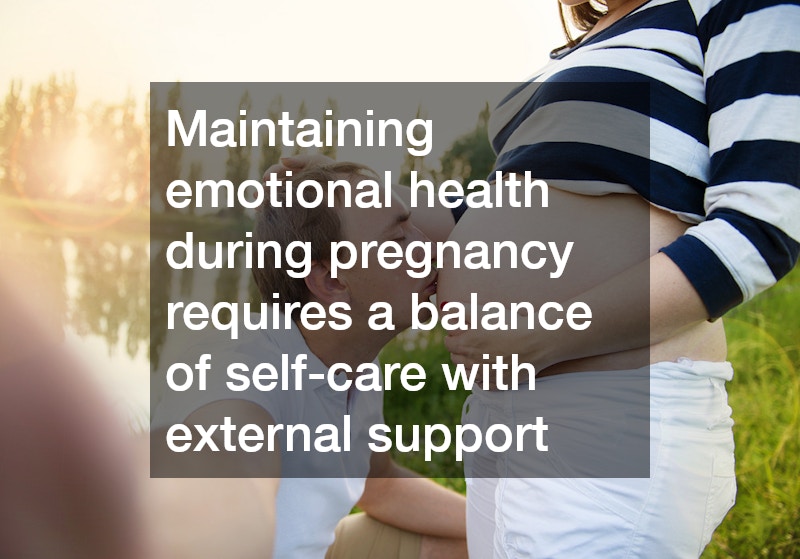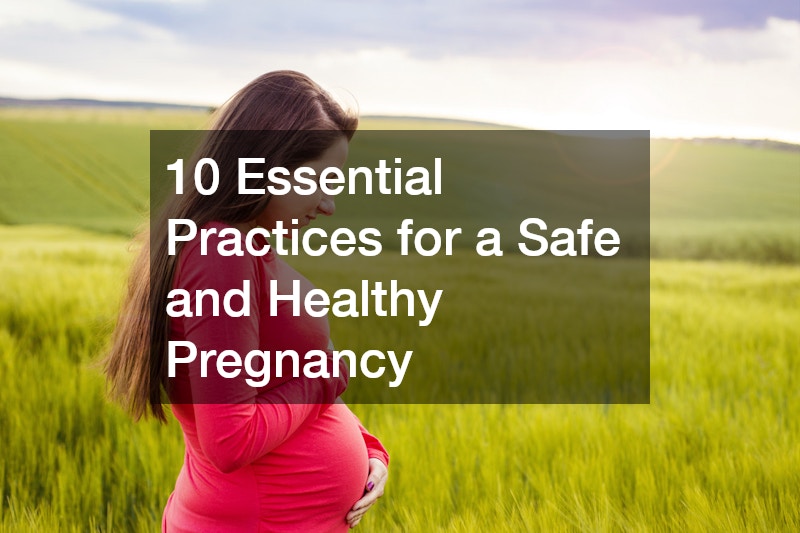10 Essential Practices for a Safe and Healthy Pregnancy
Pregnancy is an exciting and transformative period in a woman’s life. Prioritising their health and well-being is essential for expecting mothers during this time to ensure a healthy and happy pregnancy for both mother & baby. This comprehensive guide will cover ten essential practices that pregnant women should include in their daily routine to ensure optimal health. These tips on nutrition, exercise, prenatal care, and stress management will help you navigate pregnancy with confidence.
1. How Can Diet Affect Pregnancy?
A healthy and balanced diet is essential to the development and growth of your baby during pregnancy. Both mother and child benefit from a diet high in fruits, vegetables and whole grains. To support the increased needs of pregnancy, it is important to consume foods high in folic, iron, calcium and protein.
Avoiding certain foods, like raw seafood, non-pasteurised milk, and deli meats, can help prevent foodborne illness. It is important to manage cravings and nutritional requirements, since pregnant women can experience changes in their appetite and food preferences. You can get the guidance of a nutritionist or your primary care physician to ensure you meet your nutritional requirements during pregnancy.
Stay hydrated throughout the day by drinking lots of water. A healthy diet will reduce the chances of complications and improve the health of mother and child.
2. Why Is Exercise Crucial During Pregnancy?

Regular exercise can have many benefits for pregnant women, including improved cardiovascular and mental health, a reduced risk of gestational diabetes, and an improved mood and sense of well-being. You should engage in moderate and safe exercise that is appropriate to your stage of pregnancy. Expectant mothers can include low-impact exercises such as swimming, walking and prenatal yoga in their daily health routines during pregnancy.
Staying active during pregnancy can reduce discomforts related to pregnancy, such as back pain and fatigue. It is important to avoid contact sports and high-impact exercise that can cause injury. For personalised exercise advice during pregnancy, consult your healthcare provider or certified fitness trainer.
Exercise can become a part of your daily routine if you find activities that you like and are suitable for your fitness level. It can be difficult to stay motivated during pregnancy, but it is well worth the effort.
3. How Can You Ensure Comprehensive Prenatal Care?
Prenatal care is vital to monitor your pregnancy’s progress and address any concerns or complications that may arise. Regular check-ups allow for early detection and management of health issues. Your primary care physician can give you advice on the prenatal screenings and tests that are recommended during pregnancy.
It is important to choose a healthcare provider that specialises in obstetrics or gynaecology if you want comprehensive prenatal care. Understanding the importance and benefits of prenatal screenings such as blood tests, ultrasounds and genetic tests can help you to make informed decisions regarding your health and that of your child. You can also get help from your healthcare provider to manage common discomforts like morning sickness, fatigue and mood swings.
Discuss any concerns you have or questions with your healthcare provider in order to receive the best care possible throughout your pregnancy. One of the most important health practices to follow during pregnancy is to establish a close relationship with your medical team.
4. What Vitamins and Supplements Are Important During Pregnancy?
Folic acid, a vital nutrient, is essential in preventing neural tube defects in developing babies. To ensure that folic acid is present in adequate amounts during pregnancy, it is recommended for all pregnant women to take a prenatal supplement containing this nutrient. For optimal health, it is important to take folic acid along with other essential vitamins and minerals such as calcium, iron and vitamin D.
Some women will require extra supplements depending on their needs. For example, vegetarians may need vitamin B12 or those who are at risk of anaemia might need iron supplements. It is important not to overdo it on vitamins and supplements. This can harm both the mother and her baby. Consult your healthcare provider or registered dietitian for the best supplement regimen during pregnancy.
It is important to remember that your diet should be your primary source of nutrition during pregnancy. Supplements can help you meet these needs. You can promote the health and growth of your child by prioritising a healthy diet and taking supplements.
5. How Do You Reduce Stress and Boost Emotional Well-Being?

Pregnancy can cause a wide range of emotions – from excitement and joy to anxiety and insecurity. Stress and mood swings are often caused by hormonal changes and physical discomforts. Understanding how pregnancy hormones affect your emotional health can help you manage the ups-and-downs of this transformational period.
Stress management techniques, such as mindfulness meditation and gentle yoga, can reduce feelings of tension and anxiety. You can find reassurance from a partner, therapist, or family member as you navigate through the emotional challenges of being pregnant. Maintaining emotional health during pregnancy requires a balance of self-care with external support.
It is normal to feel a variety of emotions while pregnant. Seeking help is a sign that you are strong and aware of yourself. Prioritising mental health will help you better deal with pregnancy’s stressors.
6. What Are the Dangers of Substance Abuse?
Smoking during pregnancy can cause serious problems for both mothers and babies, such as miscarriage and preterm birth. To protect your baby’s health, it is important to stop smoking and to avoid second-hand smoke. Alcohol consumption can also lead to developmental delays and fetal alcohol spectrum disorder in your baby.
Illicit drug abuse during pregnancy can cause serious effects on a baby’s growth and development, and may increase the likelihood of complications during the pregnancy and delivery. It is important to seek help for substance abuse disorders in order to ensure the health of mother and child. Your healthcare provider will provide you with resources and support to help you quit smoking, reduce alcohol consumption and address drug addiction while pregnant.
Keep in mind that substance abuse during pregnancy can affect the health and development of your baby for a long time. You can protect your baby and yourself from harmful effects of substance abuse during pregnancy by making healthy choices and getting help when you need it.
7. How Important Is Sleep During Pregnancy?
Sleeping enough is important for your health during pregnancy. Sleeping well can be difficult during pregnancy due to physical discomforts like back pain, frequent urination and pregnancy insomnia. Rest and relaxation are important to alleviate discomforts and improve sleep quality.
By establishing a regular sleep schedule, you can improve the quality of your sleep and regulate your internal clock. By creating a relaxing sleep environment, you can improve your ability to relax, fall asleep, and stay asleep. This includes using supportive pillows, keeping the room cool, and minimising light and noise. Consult your healthcare provider if you are experiencing persistent insomnia or sleep problems during pregnancy.
Sleep is essential for promoting health and well-being during pregnancy. You can be well-rested by prioritising sleep and adopting healthy sleep habits.
8. What Warning Signs Should You Be Aware of During Pregnancy?
It is important to know the warning signs and symptoms that could indicate a possible complication during pregnancy. You should discuss symptoms such as severe headaches, persistent abdominal pain, and vaginal bleeding with your doctor. These symptoms could be a sign of underlying issues that require immediate attention.
Early recognition of serious complications, such as preeclampsia or gestational diabetes, can prevent further health risks for you and your baby. If you notice any changes in your emotional or physical well-being or experience unusual symptoms, it is important to notify your healthcare provider. By being proactive and seeking medical care for warning signs, you can ensure that your pregnancy is safe and healthy for both you and your child.
Prepare for an emergency by creating a plan and knowing how to get help. This can have a major impact on the outcome. It is important to be aware of environmental hazards, such as mould in your home. Contact a mould remediation service immediately and evacuate the house until it is properly treated. Be aware of the signs and symptoms that you should be on the lookout for when pregnant. Do not hesitate to contact your healthcare provider with any questions or concerns.
9. How Should You Plan for Labour and Delivery?
A birth plan defining your preferences regarding labour, delivery and postpartum can help you to feel prepared and empowered during the birthing process. Your healthcare provider can help you make necessary changes to your birth plan based on medical advice and recommendations. You can cope with the pain of labour by using techniques such as water births and epidurals.
Understanding the stages of labour, such as early labour, active birth, and transitional labour, can help you prepare for the birthing process. Talking with your doctor about postpartum care basics such as breastfeeding, newborn care and emotional well-being can help prepare you for the joys and challenges of motherhood. Every birth is different, so you should be flexible and open-minded to navigate your journey through labour and delivery.
To ensure you’re well-prepared, attend childbirth classes, talk to other mothers who are expecting, and ask for advice from medical professionals. You can prepare for labour and delivery by planning ahead and being informed.
10. How Can You Travel Safely?
To ensure the safety of mother and child, it is important to plan and prepare for travel during pregnancy. Travelling during pregnancy is best done during the second trimester, when you will have more energy and feel less discomfort. Wearing compression socks and staying hydrated are all precautions to take for long trips. Also, make sure you stretch out and move frequently. Keep a small first-aid kit handy for minor accidents. This can include band-aids, adhesive pressure-sensitive tape and extra medications.
Travelling during pregnancy can be a risky endeavour. You should consider the risks of blood clots and dehydration as well as exposure to infectious disease. To stay comfortable and well-prepared during your trip, pack essential items like fresh fruit, water, snacks and medications into your carry-on. Take precautions and be aware of your surroundings.
Prepare for unexpected circumstances, such as flight delays or medical emergencies. You should research nearby medical facilities and carry important documents. Also, you should have a plan for contacting your healthcare provider if an emergency occurs. You can travel safely and comfortably during pregnancy by following these tips and taking the necessary precautions.
In a Nutshell
Maintaining good health during pregnancy is important for both mother and child. Expectant mothers can prepare for their baby’s arrival by prioritising nutrition and exercise, stress management and sleep. Planning for delivery and labour, and being aware of safe travel tips will help you have a successful pregnancy.
Consult your healthcare provider or dentist for support and personalised guidance as you implement health practices during pregnancy. You can prioritise your health for a successful pregnancy, whether you’re considering surrogacy or seeking Hydrafacial services, maintaining established care at an orthodontic office, or managing Medical Inventory Tracking. You can create a happy and healthy pregnancy by incorporating these essential practices into your daily life.


Post Comment